archdeacons’ visitation news
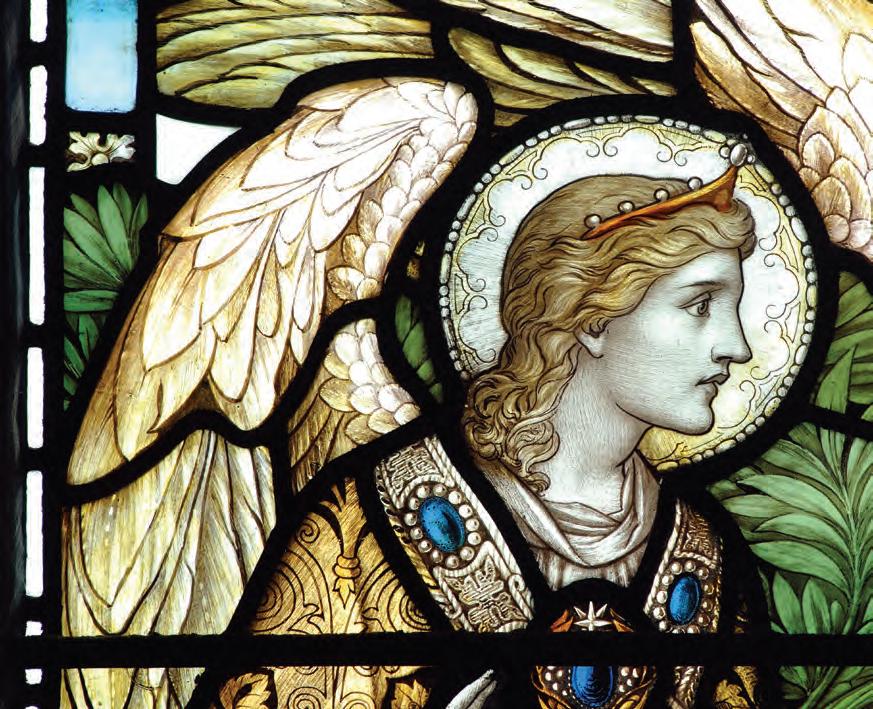
Dear churchwardens
Welcome to the 2025 edition of the Archdeacons’ Visitation News , generously provided for us once again by Ecclesiastical. We are grateful for its continued help in this and for all its support in the diocese.
As we continue to develop and embed our Ministry Areas, we hope you will enjoy these articles and the wide range of ideas and encouragement they offer us. Whether caring for our churches or studying the faith, welcoming others or nurturing our gifts in ministry, we share in this work together. We thank you for your continued dedication and hard work in your various churches and ministry areas.
Here’s to another good year of cooperation and service!
Diolch am eich cyfraniad i fywyd yr Esgobaeth. Y rydym yn ffodus iawn i gael pobl ffyddlon sydd yn sicrhau dyfodol i waith yr Efengyl yn ein cymundebau. Pob bendith arnoch a’ch teuluoedd.

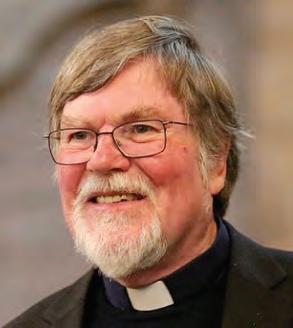
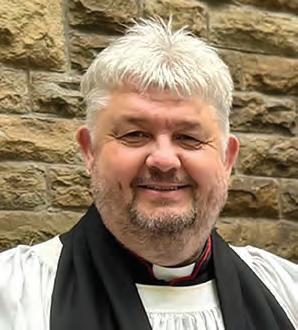
Safeguarding

A healthy Christian community is one which ensures and nurtures the wellbeing of all. Safeguarding needs to be embedded in all aspects of the life and ministry of the Church, and safeguarding training and development at the Church in Wales is delivered in this context. The training will equip us and our churches to engage positively with the protection of children, young people and vulnerable adults in a practical and informed manner.
The training is designed and delivered by experienced and skilled trainers, committed to ensuring the Church is a safe and welcoming place for all, who understand the statutory requirements of safeguarding children and adults, and how these are carried out in the context of the Church in Wales.
Module A is a basic Safeguarding Awareness course. Module B considers Safeguarding in the Church and is a requirement for all clergy, churchwardens, licensed readers, vergers, Ministry Area Council members, Ministry Area safeguarding officers and anyone who has a role which involves working with children, young people and adults at risk. The training needs to be renewed every three years and takes about 2 hours to complete.
For more information about safeguarding, visit the Church in Wales’ safeguarding page:
churchinwales.org.uk/en/clergy-and-members/ safeguarding



Ministry belongs to all of us

And then in the county of Oxford in the 1780s, around 100 of the 165 incumbents were non-resident and in the Diocese of Exeter, 159 out of 290 were non resident. And in such areas, such clerical work as was done was performed by curates who were known as ‘gallopers’ ... known for their dexterity in speeding from one church to another, to serve as many churches as they could for a fee of half a guinea per service. The effects of this were obvious ... rushed services which took place at no fixed time. Charlotte Young recorded that at Otterbourne, at the end of the eighteenth century, there was only one service and that the bells were rung when the curate could be seen riding towards the church. And George Horne (who later became Bishop of Norwich) wrote in 1787 of his visit to a country church:



“Now wouldn’t it just be great if we could go back to the way the Church used to be ... you know ... each parish having their own vicar who looked after their own church. You knew where you were then. And you used to see the vicar around ... you know ... popping in for an afternoon cup of tea ... walking the parish ... knowing who everyone was and what they were up to. Life was simpler then ... If you didn’t bump into them as they were going about their rounds ... well you could always call at the Vicarage and you’d be made welcome by the vicar’s wife ... a cup of tea and a piece of cake and a nice chat about the way things are in the village ... Oh those halcyon days.”


Well, reality was that it was not always quite like that. The idea that in the past each community had their own church which was looked after by their own vicar who was known and loved by everyone is more a myth than a reality. You get a glimpse of what the country parson was like in the early eighteenth century from Henry Fielding’s 1742 novel called ‘The Adventures of Joseph Andrews’. He was ‘a parson on Sundays, but all the other six he might be more properly called a farmer. He occupied a small piece of land of his own, besides which he rented a considerable amount more. His wife milked his cows, managed his dairy, and followed the markets with butter and eggs’. That’s fiction.
But fact was the Curate of Lastingham in the early eighteenth century who had 13 children to keep on a stipend of £20. His wife kept the local public house and he was able to convince the Archdeacon that his indirect clerical management and his fiddle playing were an aid to his parishioners’ piety.
‘The minister of this noble edifice was answerable to it in dress and manner. Having entered the church he made the best of his way to the chancel where he changed his wig, put on a filthy iron-moulded ragged surplice; and after a short angry dialogue with the clerk, entered his desk and began immediately without looking into the book. He read as if he had ten other churches to serve that day, at as many miles distant from one another. The clerk sang a melancholy solo – neither tune nor words of which I have ever heard before.’

It is good to remember that we are not on a steady downward slope in terms of ministry. Lots of people have a vision of a sort of Victorian hey day when things were probably more settled. But it is good to remember that Christian ministry in this country has always been subject to change and movement.
In our own time we are rediscovering the value of ministry that is offered by folk in part-time appointments or folk who earn their livings in other contexts. We are also learning to rediscover the real value of the gift of ministry that lay people offer. Increasingly, clergy are having to see themselves not so much as offering ministry to the lay people among whom they serve ... but rather sharing with the lay people a common ministry which belongs to all those baptised as the followers of Jesus.
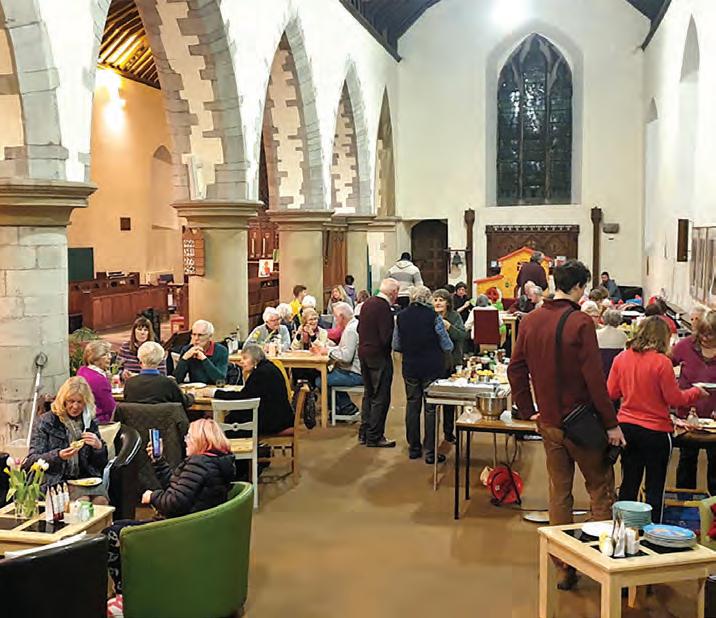
Support and resources for Churchwardens from Ecclesiastical
Ecclesiastical understands that volunteering for the role of Churchwarden and supporting your church can be a demanding job. Managing a treasured building and ensuring that it’s a safe place for your congregation to worship, visit and enjoy can be daunting, but you don’t have to do it alone.
Ecclesiastical church support managers
At no additional cost, Church Support Managers are there for their Ecclesiastical church customers. Providing tailored help and training to support church insurance needs, they can offer guidance on risk management, health and safety legislation and direct you to online resources. They can also deliver online and in-person group training sessions around topics including the basics of insurance, fire safety, fundraising, climate change and net zero, open churches and theft of metal.
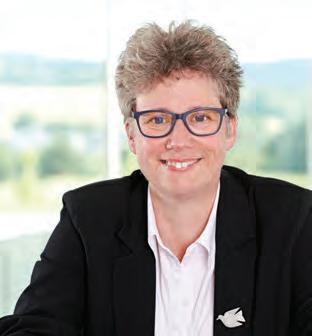

Heather Ford – Church Support Manager for the North.
Heather has roots in the Church, having previously worked for the Diocese of Manchester, and understands the demands of church life. Heather is passionate about supporting churches to understand how insurance can help, rather than hinder, to enable people to focus on their ministry and thrive.
Joseph Davies – Church Support Manager for the South.
Joseph is very much part of the Church family – his father was a parish priest, his mother a hospital chaplain, his wife was recently ordained as a curate, and he spent nine years as a verger at Salisbury and Ely Cathedrals.

Fundraising hub
Fundraising plays a key role in boosting finances for your church. Ecclesiastical’s fundraising hub offers user-friendly support guides which take you from ‘where to start’ through to ‘key factors for successful fundraising’ and everything in between.
If you have an Ecclesiastical policy, you can also contact their fundraising helpline, to arrange a call back from their expert team.
0345 601 9959 ecclesiastical.com/church/fundraising
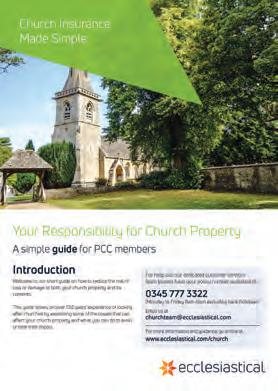
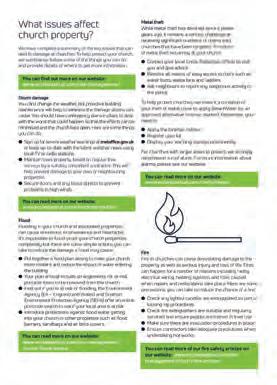
Ecclesiastical’s plain English guides
If you are looking for help in areas such as legal expenses, building work, or outreach, Ecclesiastical has a range of easy to understand Made Simple Guides to help, and their comprehensive document library is full of useful tools like risk assessment templates and Guidance Notes.
e cclesiastical.com/ church/#madesimple
Ecclesiastical church insurance team
Do you have questions about your Ecclesiastical policy?
0345 777 3322 – lines are open 8am – 6pm Monday to Friday, excluding Bank Holidays churchteam@ecclesiastical.com
Risk Advice Helpline
Are you looking for advice on how to minimise risks as you manage your church?
0345 600 7531 – lines are open 9am – 5pm Monday to Friday, excluding Bank Holidays risk.advice@ecclesiastical.com
A claims team that really cares
Ecclesiastical’s claims team are experts.
0345 603 8381 – 24-hour reporting service ecclesiastical.com/claims/claim-online
Ecclesiastical
Fundraising is crucial for sustaining church activities and initiatives. I am always delighted to offer guidance on effective fundraising strategies. We have an excellent online Fundraising Hub which has lots of information about how to get started and how to keep going on your fundraising journey.

meetus@ecclesiastical.com ecclesiastical.com/church/church-support-managers
Do you have a story for Ecclesiastical? Perhaps you overcame a fundraising problem or found a way to get your local community more involved with your church. Sharing ‘a day in your life’ could really help other Churchwardens and members of the PCC. meetus@ecclesiastical.com
Month-by-month support
To help you plan maintenance and manage your church and its grounds, Ecclesiastical has created a calendar to keep you organised and on track – you can download your copy using this link: ecclesiastical.com/risk-calendar

Get monthly tips straight to your inbox

Join the community of church leaders who receive Ecclesiastical’s monthly e-newsletter. It’s packed with valuable advice about church security, event planning, fundraising and more.
Many of Ecclesiastical’s customers already benefit from this e-newsletter, and we hope you’ll join them.
Feel free to share the sign-up link with others in your church community who might be interested.
Why should net zero be a focus for churches?
A Q&A with the Church of England
In 2024, our Group’s charitable owner, Benefact Trust, pledged £1.5m towards the Church of England’s ambitious goal of reaching net zero by 2030. Benefact Trust’s funding is focused on equipping and inspiring churches across the UK to start their journey to net zero and reduce their impact on the environment.
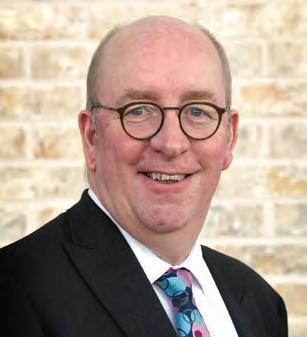
Benefact Trust sat down with Julian Atkins, Net Zero Programme Director for the Church of England, to talk through some of the most commonly asked questions about the Church’s net zero goal.
Whilst many of us want to play an active role in tackling climate change, the prospect can seem overwhelming due to the scale of the issue, the urgency to take action and the abundance of complicated information. In Benefact Trust’s short Q&A with Julian, he emphasises how important it is to keep things simple and start small.
Julian discusses what net zero actually means, why the Church has a responsibility to reduce its impact on the climate and low-cost ways to get started. Watch ‘Net Zero and the Church’ on Benefact Trust’s YouTube channel: youtube.com/@benefacttrust
Here you’ll find a host of helpful videos, including a full podcast with Julian Atkins.
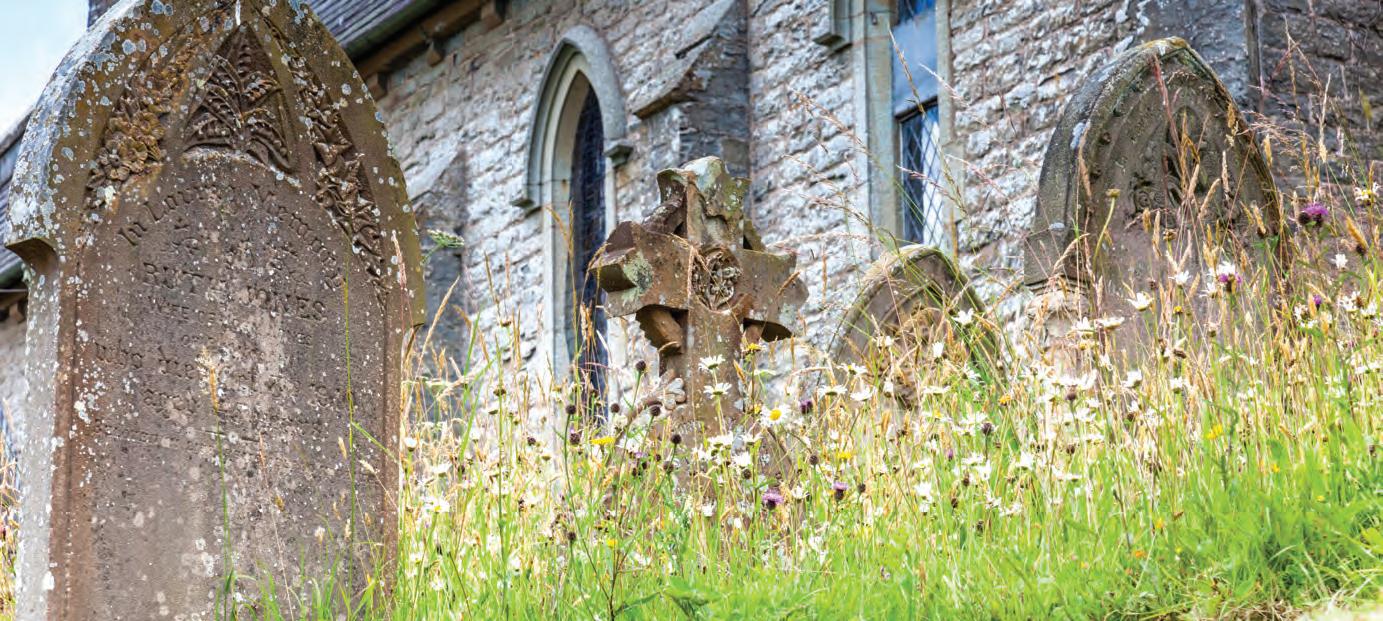
Ecclesiastical supports sabbaticals
Ecclesiastical aims to support Anglican clergy by offering financial assistance for life-affirming sabbaticals through their Ministry Bursary Awards (MBAs).
Established in 1987, these awards have distributed over £1.4 million, benefiting more than 1,500 clergy members. An MBA can rejuvenate and enhance the ministerial development of clergy, offering them opportunities to engage in extended study, travel, or other enriching activities that can have a lasting impact on their personal growth and to the ministering of their congregations.

The Revd Adam Dickens is a recent recipient of such an MBA and he told Ecclesiastical:

I was very grateful for the MBA grant as it facilitated my sabbatical visit to Kolkata and wider West Bengal where I spent a month engaging with projects run by the Cathedral Relief Service of Kolkata Cathedral, as well as visiting various establishments that came under the ambit of the Diocese of Calcutta; these included churches, schools, colleges, a TB clinic, an AIDs hospice and a residential home.

It was an extremely rich time as I was offered a window into the joy and despair of life for people living in the city (as well as some of the rural areas in the state of West Bengal) and the creative ways in which church communities were responding. It provided interaction with a very different culture to the one I’m used to inhabiting, with all the challenges and growth that comes with it.

The application window for the 2026 MBA programme opens in spring 2025 and closes in September 2025. In 2026, we are particularly keen to see more sabbaticals which aim to support the drive for carbon net zero.
If you would like to find out more about the Awards, including eligibility criteria and application details, please visit:
ecclesiastical.com/mba

Give yourself a financial health check
In today’s world, with the high cost of living and rising taxation, it’s more important than ever to ensure your finances are in top shape.
Expert advice for clergy

Ben Dabbs, an independent financial adviser with Ecclesiastical Financial Advisory Service (EFAS), emphasises the importance of financial planning for clergy.
“With little time available for clergy in their busy lives to focus on themselves, it’s important for them to seek expert advice to manage their finances effectively and ensure their personal well-being and that of their dependants is planned and catered for,” he explains. “Too often, clergy members will delay financial planning until the twilight of their ministry, which can lead to unnecessary hardship.”
Plan ahead with confidence
To help you review your financial arrangements, such as life assurance, pension savings, investments, mortgage options 1 and retirement planning, it’s worthwhile seeking expert advice from an independent financial adviser who understands your circumstances and can put in place a plan to help give you peace of mind for the future.
If you would like to arrange a financial health check or receive a brochure providing information about the advice and services available, please contact EFAS at:
0800 107 0190 getadvice@ecclesiastical.com ecclesiastical.com/financial-advice
1 Your home may be repossessed if you do not keep up repayments on a mortgage. The value of your investments including pension investments can fluctuate, and you may not get back the amount you invested. Your capital is at risk.

Join the Movement for Good
Ecclesiastical is part of the Benefact Group and we do financial services differently – we give all available profits to charity and good causes. It’s thanks to our customers that we can make this happen.
The Movement for Good Awards is our annual giving programme and anyone can get involved. The Awards give you the opportunity to nominate the charitable causes that matter most to you.
We’re proud to have supported churches, Scouts groups, food banks, hospices, heritage charities and more, all nominated by their supporters.
How to nominate a charity or church to win £1,000
1. Visit movementforgood.com/ecclesiastical
2. Nominate before 15 December 2025. Your nomination will be included in all the remaining £1,000 draws in 2025, so the earlier you nominate, the more chances you have. It’s one nomination per charity, per person, so you can get as many as you like in the mix.
3. Further down the page, there are resources you can personalise and share with your colleagues and congregation to encourage more nominations.
4. K eep scrolling to sign up for notifications, including special £5,000 draws and larger awards through partnership funding.
Trust Ecclesiastical to insure your home and give back to your church!
As a church official, your home could serve as both a living space and a place for your ministry. You might host prayer meetings and counselling sessions from your home, or even help parishioners plan weddings and funerals. You will be supporting your parishioners throughout the years, and Ecclesiastical Insurance is there to support you, with their tailored home insurance policies.
A home insurance policy from Ecclesiastical Insurance can be adapted to suit the needs of the clergy in your work on behalf of the Church, or the general needs of your congregation and community.
Ecclesiastical Home Insurance
Ecclesiastical Home Insurance provides up to £750,000 for buildings and £75,000 for contents as standard. This cover includes protection for your home, personal belongings and even contents away from home up to £3,500. Additionally, 24-hour home emergency assistance and legal expenses are included, helping to ensure you are covered in unexpected situations.
But there is more!
When you take out a new home insurance policy with Ecclesiastical, they will donate £130 to an Anglican church or cathedral of your choice 1 – this programme has already contributed over £500,000, to churches across the country.
You can trust Ecclesiastical. They regularly win coveted awards for their home insurance products. In November last year, they retained their top spot in the Fairer Finance Home Insurance league table for a record twentieth time and remain the UK’s most trusted home insurance provider! 2 Importantly, in today’s online world, they also have an ‘Excellent’ score on Trustpilot too. 3
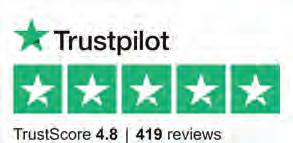
When you talk to the friendly experts at Ecclesiastical’s UK-based Head Office, they will work with you to make sure that your home and its contents are well-protected against a variety of risks. By choosing Ecclesiastical, you’re not just insuring your home; you could also be helping your church. Call us today!
0345 777 3322 and quote CHOPS25 ecclesiastical.com/homeinsurance
You’ll also find more information about the Awards, including the terms and conditions at: movementforgood.com/tc
Best of luck!
1 Terms and conditions apply. Visit ecclesiastical.com/trust130terms. 2 Fairer Finance Home Insurance customer experience rating, spring and autumn 2015 – 2024. 3 Trustpilot reviews – 419 between 1 February 2023 – 14 April 2025. Correct at time of going to print.
Ring out the old, ring in the new

We are grateful to David Childs, our Bell Advisor for Swansea and Brecon Diocesan Guild of Bell Ringers, for providing the following article.
Bells are traditional in many churches and chapels. However, full circle rings, that is where a bell turns 360 degrees and then goes back 360 degrees, are less common in Wales.
There are approximately 7,200 full circle rings of 3 or more bells in the world with 6,700 in England alone. There is approximately 230 in Wales and 39 in our diocese. Not all these are in good repair or available to ring, so only 26 are available to ring full circle regularly.
Bells are traditionally weighed in hundred weight (CWT), with one hundred weight being equal to 112 pounds, 8 stone, or 50.8 kilos.
Bells which are not full circle rings are normally chimed with either a hammer being hit against the outside of the bell or the clapper being pulled to strike the inside of the bell. There are probably more churches with these in our diocese than full circle rings.
Following the formation of the diocese in 1923, the Swansea and Brecon Diocesan Guild of Bellringers was founded in October that year. The ‘Guild’ arranges practices and training for ringers from all over the diocese. It also has a small bell restoration fund. We hope to be able to help parishes in difficulties with their bells regardless of whether they are chimes or full circle rings.

We have some ancient bells in our diocese as well. Bryngwyn has a bell from the early thirteenth century, so has been in use for over 700 years. We also have one of only two complete rings of bells cast by Evan I Evans of Chepstow in 1719 at Cwmdu (the other being in Bristol) and two of only seven complete rings of cast bells by Llewellins and James of Bristol at Nantmel and Cefn Coed. We have many unusual and old bells (pre 1650) in our diocese, some being the only known bells by certain founders.
The largest bell in the diocese is at the newly created Swansea Minster, which weighs just over one tonne. The bells in the Minster are ‘down’ and can only be chimed in that position. The bells are
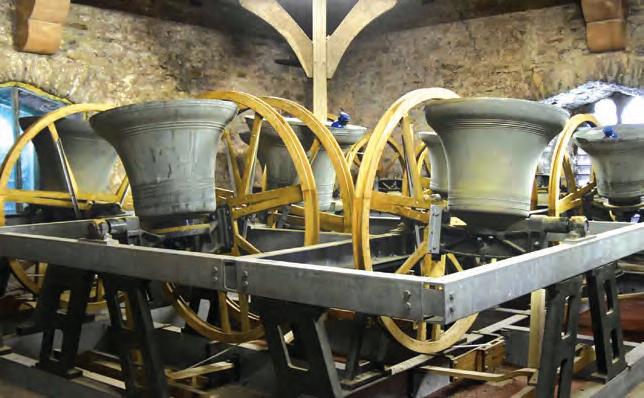
safe in this position. This is often the case when there is a clock that strikes on the bells.
To ring them full circle, the bells have to be raised and sit mouth upwards. The ten bells at Brecon Cathedral need to be raised ready for ringing. The tenor or largest bell here weighs 16 ½ cwt.
So why worry about the bells?
Bells are the largest musical instruments and can be heard often many miles from the churches. They used to be rung to tell the parish that a service was about to take place or that the sacrament was being blessed. Nowadays the bells are rung to let people know that the church is here and active. What is said in sermons is listened to by the people in the church, but the bells are heard by the community at large and give out their message. Bells have also become very sentimental to many communities. The five Swiss bells at Cwmbach Llechryhd have just been restored as they are unique in the UK, something of which the small village is very proud.
Bellringers are a very sociable bunch, meeting for practice nights in various churches around the diocese and ringing for Sunday services, sometimes more than one church in an area. Bellringers also ring for weddings, funerals and special occasions when needed. Bellringing is also a fascinating hobby; no two rings of bells are the same. There is an opportunity to visit other churches, often off the beaten track. It is gentle physical exercise (apart from ringing bells up) and good mental exercise, you can never stop learning new things to ring.
For more information on bells and ringing, please visit:
sbdg.co.uk or email David Childs on: builthbells@gmail.com
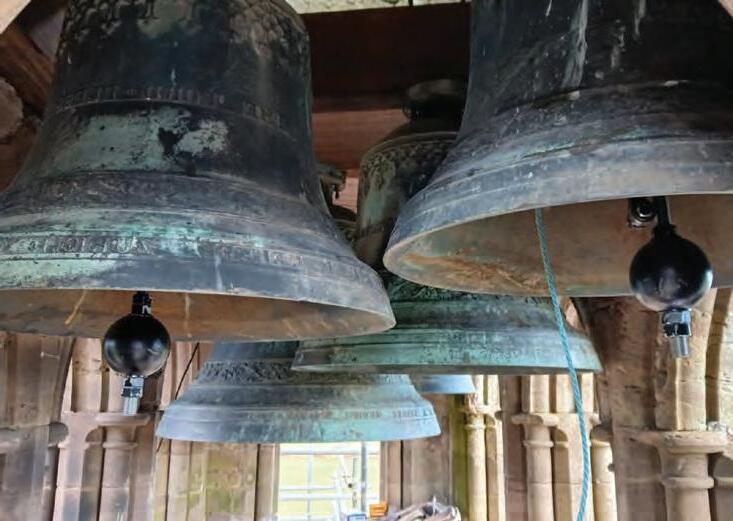
Rural congregations trail blaze unity

In the small village of Llanwrthwl in Powys on 1 February 2025, an important ecumenical step forward was taken. The Church of St Gwrthwl and Penuel United Reformed Church committed to forming one congregation, which will worship in the Penuel building. This is the first new Local Ecumenical Partnership to be established for some years under the Church in Wales Ecumenical Canons.
This commitment now allows clergy and the lay leaders of both denominations to fully minister together to the community. The Sunday services in the chapel in the future will be reflecting both traditions.
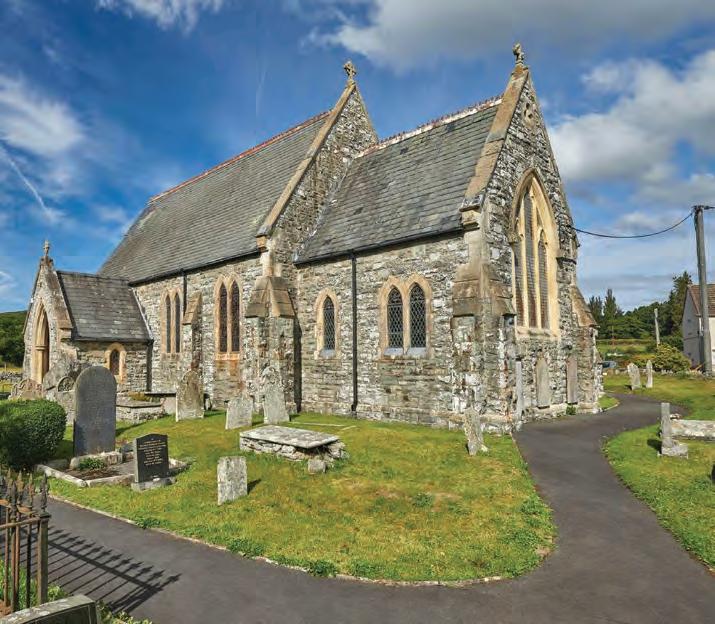
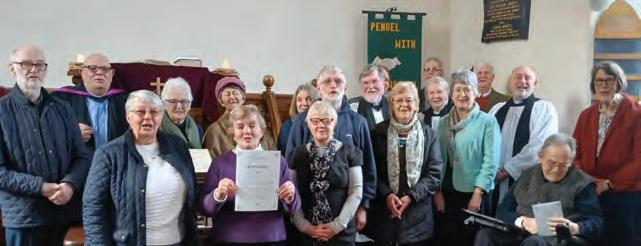
In a moving memory of the founding of the original congregational chapel in 1832, all the members of the two churches signed a new local Covenant. This specifies how the churches will work together, respecting both traditions but ready to work as one as they minister to those around them. The Covenant was written after a lot of consultation between the local churches and denominational leaders.
The words used when introducing the Covenant were based on the Local Covenant for Unity in Wales, which celebrated its fiftieth anniversary this year. This commitment half a century ago was made between the Church in Wales, the Presbyterian Church of Wales, the Methodist Church, the United Reformed Church and the Covenanted Baptist churches in Wales.
It is the hope of the Covenant partners that this initiative in Llanwrthwl will inspire other communities – urban and rural –to take visible steps towards the unity of God’s people.
The service was led by the local clergy: Revd Chris Coe and the Revd Robert Simpson; Archdeacon of Brecon, the Venerable Alan Jevons; The President of the URC in Wales, the Revd David Salsbury; and the Welsh Ecumenical Officer of the URC, the Revd Martin Spain. The guest preacher was the Revd Gethin Rhys, Cytûn (Churches Together in Wales), who delivered a sermon encouraging the church to rise and live in its community. The Archdeacon said, “At a time when we hear so much about division and conflict, it was great to see Christians embracing each other and working towards unity and harmony.” Martin Spain said, “The impetus to form a partnership came from the local churches. The two congregations had been working together for some time and it was decided that a more formal arrangement would be good. These local decisions led to the formation of a Covenant, which in turn lays the groundwork to be one congregation. The Covenant enabled an agreement to share the building and a new constitution. Chris Coe added, “Today was an historic day.”
For more information
Call: 0345 777 3322 Email: churchteam@ecclesiastical.com Facebook: Ecclesiastical

Whilst Ecclesiastical has used reasonable endeavours to ensure that the information in this newsletter is correct at the time of publication, please note: (a) the information is not intended to constitute a definitive or complete statement of the law on any subject, (b) the information may over the course of time become incorrect or out of date; and (c) neither Ecclesiastical Insurance Office plc. nor its subsidiaries or parent company can accept any responsibility or liability for action taken or losses suffered as a result of reliance placed on the information provided in this newsletter. Ecclesiastical Insurance Office plc (EIO) Reg. No. 24869. Benefact Group plc Reg. No. 01718196. Benefact Trust Limited Reg. No. 1043742. Benefact Trust Limited is a Charity registered in England and Wales with Reg. No. 263960. Ecclesiastical Financial Advisory Services Ltd (EFAS) Reg. No. 2046087. Ecclesiastical Planning Services Limited (EPSL) Reg. No. 2644860. South Essex Insurance Brokers Limited (SEIB) Reg. No. 06317314. All companies are registered in England at Benefact House, 2000 Pioneer Avenue, Gloucester Business Park, Brockworth, Gloucester, GL3 4AW, United Kingdom. EIO is authorised by the Prudential Regulation Authority and regulated by the Financial Conduct Authority and the Prudential Regulation Authority. Firm Reference Number 113848. EFAS, EPSL and SEIB are authorised and regulated by the Financial Conduct Authority. Firm Reference Numbers 126123 (EFAS), 958152 (EPSL) and 47947 (SEIB).
